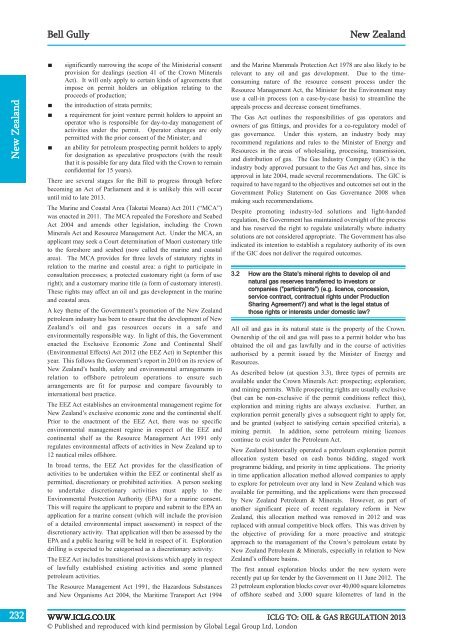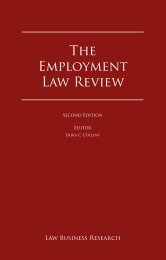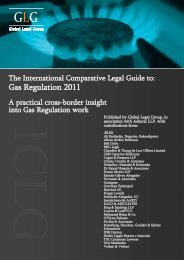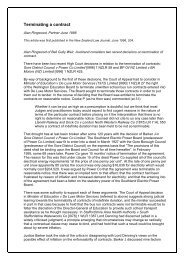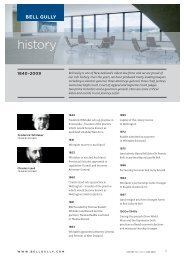Oil & Gas Regulation 2013
NZ Oil & Gas Chapter - The International Comparative ... - Bell Gully
NZ Oil & Gas Chapter - The International Comparative ... - Bell Gully
Create successful ePaper yourself
Turn your PDF publications into a flip-book with our unique Google optimized e-Paper software.
Bell Gully<br />
New Zealand<br />
New Zealand<br />
significantly narrowing the scope of the Ministerial consent<br />
provision for dealings (section 41 of the Crown Minerals<br />
Act). It will only apply to certain kinds of agreements that<br />
impose on permit holders an obligation relating to the<br />
proceeds of production;<br />
the introduction of strata permits;<br />
a requirement for joint venture permit holders to appoint an<br />
operator who is responsible for day-to-day management of<br />
activities under the permit. Operator changes are only<br />
permitted with the prior consent of the Minister; and<br />
an ability for petroleum prospecting permit holders to apply<br />
for designation as speculative prospectors (with the result<br />
that it is possible for any data filed with the Crown to remain<br />
confidential for 15 years).<br />
There are several stages for the Bill to progress through before<br />
becoming an Act of Parliament and it is unlikely this will occur<br />
until mid to late <strong>2013</strong>.<br />
The Marine and Coastal Area (Takutai Moana) Act 2011 (“MCA”)<br />
was enacted in 2011. The MCA repealed the Foreshore and Seabed<br />
Act 2004 and amends other legislation, including the Crown<br />
Minerals Act and Resource Management Act. Under the MCA, an<br />
applicant may seek a Court determination of Maori customary title<br />
to the foreshore and seabed (now called the marine and coastal<br />
area). The MCA provides for three levels of statutory rights in<br />
relation to the marine and coastal area: a right to participate in<br />
consultation processes; a protected customary right (a form of use<br />
right); and a customary marine title (a form of customary interest).<br />
These rights may affect an oil and gas development in the marine<br />
and coastal area.<br />
A key theme of the Government’s promotion of the New Zealand<br />
petroleum industry has been to ensure that the development of New<br />
Zealand’s oil and gas resources occurs in a safe and<br />
environmentally responsible way. In light of this, the Government<br />
enacted the Exclusive Economic Zone and Continental Shelf<br />
(Environmental Effects) Act 2012 (the EEZ Act) in September this<br />
year. This follows the Government’s report in 2010 on its review of<br />
New Zealand’s health, safety and environmental arrangements in<br />
relation to offshore petroleum operations to ensure such<br />
arrangements are fit for purpose and compare favourably to<br />
international best practice.<br />
The EEZ Act establishes an environmental management regime for<br />
New Zealand’s exclusive economic zone and the continental shelf.<br />
Prior to the enactment of the EEZ Act, there was no specific<br />
environmental management regime in respect of the EEZ and<br />
continental shelf as the Resource Management Act 1991 only<br />
regulates environmental affects of activities in New Zealand up to<br />
12 nautical miles offshore.<br />
In broad terms, the EEZ Act provides for the classification of<br />
activities to be undertaken within the EEZ or continental shelf as<br />
permitted, discretionary or prohibited activities. A person seeking<br />
to undertake discretionary activities must apply to the<br />
Environmental Protection Authority (EPA) for a marine consent.<br />
This will require the applicant to prepare and submit to the EPA an<br />
application for a marine consent (which will include the provision<br />
of a detailed environmental impact assessment) in respect of the<br />
discretionary activity. That application will then be assessed by the<br />
EPA and a public hearing will be held in respect of it. Exploration<br />
drilling is expected to be categorised as a discretionary activity.<br />
The EEZ Act includes transitional provisions which apply in respect<br />
of lawfully established existing activities and some planned<br />
petroleum activities.<br />
The Resource Management Act 1991, the Hazardous Substances<br />
and New Organisms Act 2004, the Maritime Transport Act 1994<br />
and the Marine Mammals Protection Act 1978 are also likely to be<br />
relevant to any oil and gas development. Due to the timeconsuming<br />
nature of the resource consent process under the<br />
Resource Management Act, the Minister for the Environment may<br />
use a call-in process (on a case-by-case basis) to streamline the<br />
appeals process and decrease consent timeframes.<br />
The <strong>Gas</strong> Act outlines the responsibilities of gas operators and<br />
owners of gas fittings, and provides for a co-regulatory model of<br />
gas governance. Under this system, an industry body may<br />
recommend regulations and rules to the Minister of Energy and<br />
Resources in the areas of wholesaling, processing, transmission,<br />
and distribution of gas. The <strong>Gas</strong> Industry Company (GIC) is the<br />
industry body approved pursuant to the <strong>Gas</strong> Act and has, since its<br />
approval in late 2004, made several recommendations. The GIC is<br />
required to have regard to the objectives and outcomes set out in the<br />
Government Policy Statement on <strong>Gas</strong> Governance 2008 when<br />
making such recommendations.<br />
Despite promoting industry-led solutions and light-handed<br />
regulation, the Government has maintained oversight of the process<br />
and has reserved the right to regulate unilaterally where industry<br />
solutions are not considered appropriate. The Government has also<br />
indicated its intention to establish a regulatory authority of its own<br />
if the GIC does not deliver the required outcomes.<br />
3.2 How are the State’s mineral rights to develop oil and<br />
natural gas reserves transferred to investors or<br />
companies (“participants”) (e.g. licence, concession,<br />
service contract, contractual rights under Production<br />
Sharing Agreement?) and what is the legal status of<br />
those rights or interests under domestic law?<br />
All oil and gas in its natural state is the property of the Crown.<br />
Ownership of the oil and gas will pass to a permit holder who has<br />
obtained the oil and gas lawfully and in the course of activities<br />
authorised by a permit issued by the Minister of Energy and<br />
Resources.<br />
As described below (at question 3.3), three types of permits are<br />
available under the Crown Minerals Act: prospecting; exploration;<br />
and mining permits. While prospecting rights are usually exclusive<br />
(but can be non-exclusive if the permit conditions reflect this),<br />
exploration and mining rights are always exclusive. Further, an<br />
exploration permit generally gives a subsequent right to apply for,<br />
and be granted (subject to satisfying certain specified criteria), a<br />
mining permit. In addition, some petroleum mining licences<br />
continue to exist under the Petroleum Act.<br />
New Zealand historically operated a petroleum exploration permit<br />
allocation system based on cash bonus bidding, staged work<br />
programme bidding, and priority in time applications. The priority<br />
in time application allocation method allowed companies to apply<br />
to explore for petroleum over any land in New Zealand which was<br />
available for permitting, and the applications were then processed<br />
by New Zealand Petroleum & Minerals. However, as part of<br />
another significant piece of recent regulatory reform in New<br />
Zealand, this allocation method was removed in 2012 and was<br />
replaced with annual competitive block offers. This was driven by<br />
the objective of providing for a more proactive and strategic<br />
approach to the management of the Crown’s petroleum estate by<br />
New Zealand Petroleum & Minerals, especially in relation to New<br />
Zealand’s offshore basins.<br />
The first annual exploration blocks under the new system were<br />
recently put up for tender by the Government on 11 June 2012. The<br />
23 petroleum exploration blocks cover over 40,000 square kilometres<br />
of offshore seabed and 3,000 square kilometres of land in the<br />
232 WWW.ICLG.CO.UK<br />
ICLG TO: OIL & GAS REGULATION <strong>2013</strong><br />
© Published and reproduced with kind permission by Global Legal Group Ltd, London


